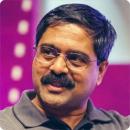Venkat Subramaniam
Salt Lake Software Symposium
Salt Lake City · July 8 - 9, 2011

Founder @ Agile Developer, Inc.
Dr. Venkat Subramaniam is an award-winning author, founder of Agile Developer, Inc., creator of agilelearner.com, and an instructional professor at the University of Houston.
He has trained and mentored thousands of software developers in the US, Canada, Europe, and Asia, and is a regularly-invited speaker at several international conferences. Venkat helps his clients effectively apply and succeed with sustainable agile practices on their software projects.
Venkat is a (co)author of multiple technical books, including the 2007 Jolt Productivity award winning book Practices of an Agile Developer. You can find a list of his books at agiledeveloper.com. You can reach him by email at venkats@agiledeveloper.com or on twitter at @venkat_s.
Presentations
State of Scala
Scala, the hybrid functional, fully object-oriented language has evolved over the years. In this presentation we will talk about what has changed in this language in the recent release and look at some cool things you can do with this very powerful language.
Keynote: The rise and fall of empires: Lessons for language designers and programmers
Keynote on lessons we can learn from our civilizations and evolution.
Integrating JVM Languages
Quite a few languages have raised to prominence on the JVM. A frequently asked question is “How do I integrate my Java code with these?” This session answers that very specific question.
Testing with Spock
Spock is an awesome tool that exploits Groovy AST transformation to provide elegant, fluent syntax for writing automated unit tests and functional tests. In this presentation we will learn how to use Spock to unit test both Java and Groovy code.
Collections for Concurrency
Traditional collections on the Java platform focused on providing thread-safety at the expense of performance or scalability. More modern data structures strive to provide performance without compromising thread-safety. Some of them require you to adopt to a different semantics or programming model. In this presentation we will explore some data structures that can help reach both thread-safety and reasonable performance.
